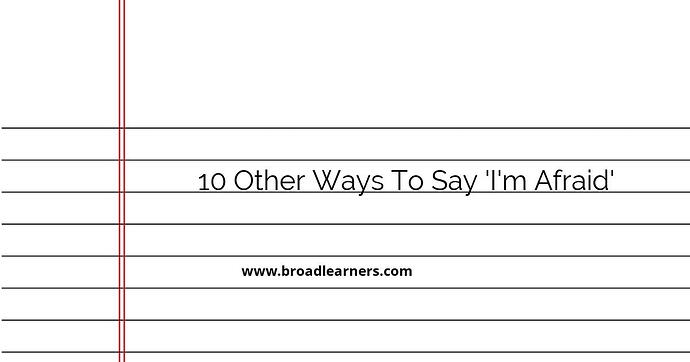Expressing fear or concern is a common part of communication. While saying 'I'm afraid' is a straightforward way to convey this, there are several other phrases you can use to express the same sentiment. Here are 10 alternative ways to say 'I'm afraid':
- I'm concerned
- I'm worried
- I'm apprehensive
- I'm uneasy
- I'm a bit scared
- I have reservations
- I'm feeling anxious
- I'm feeling fearful
- I'm feeling nervous
- I have trepidation
Let's explore each alternative phrase with examples:
1. I'm concerned
Instead of saying 'I'm afraid,' you can say 'I'm concerned.' This phrase indicates that you have worries or doubts about a particular situation.
Example: I'm concerned about the safety of our new neighborhood.
2. I'm worried
If you want to express fear or apprehension, you can use the phrase 'I'm worried.' It implies that you have anxieties or fears about something.
Example: I'm worried about the upcoming exam; I haven't had enough time to prepare.
3. I'm apprehensive
'I'm apprehensive' is a formal way to convey fear or uneasiness. It suggests that you have doubts or concerns about a particular situation or outcome.
Example: I'm apprehensive about giving a presentation to such a large audience.
4. I'm uneasy
If you feel uncomfortable or nervous about something, you can use the phrase 'I'm uneasy.' It indicates a sense of unease or discomfort.
Example: I'm uneasy about traveling alone in unfamiliar places.
5. I'm a bit scared
To express mild fear or concern, you can say 'I'm a bit scared.' It conveys a slight sense of fear or nervousness.
Example: I'm a bit scared of heights, but I'm willing to try the roller coaster.
6. I have reservations
If you have doubts or concerns about a decision or plan, you can use the phrase 'I have reservations.' It suggests that you are unsure or hesitant.
Example: I have reservations about accepting the job offer due to the long commute.
7. I'm feeling anxious
To convey a sense of nervousness or worry, you can say 'I'm feeling anxious.' It indicates that you are experiencing anxiety or unease.
Example: I'm feeling anxious about the outcome of the interview.
8. I'm feeling fearful
If you want to express a strong sense of fear, you can use the phrase 'I'm feeling fearful.' It conveys a heightened state of fear or apprehension.
Example: I'm feeling fearful about walking alone in the dark.
9. I'm feeling nervous
To express a sense of nervousness or jitters, you can say 'I'm feeling nervous.' It suggests that you are experiencing anxiety or tension.
Example: I'm feeling nervous about the upcoming job interview.
10. I have trepidation
If you want to convey a sense of fear or unease, you can use the phrase 'I have trepidation.' It implies that you have strong reservations or fears.
Example: I have trepidation about speaking in public; it makes me extremely nervous.
By using these alternative phrases, you can effectively express your fear or concern in various situations. Remember to choose the phrase that best suits the context and level of fear or unease you want to convey.
Did I miss anything? Respond below
